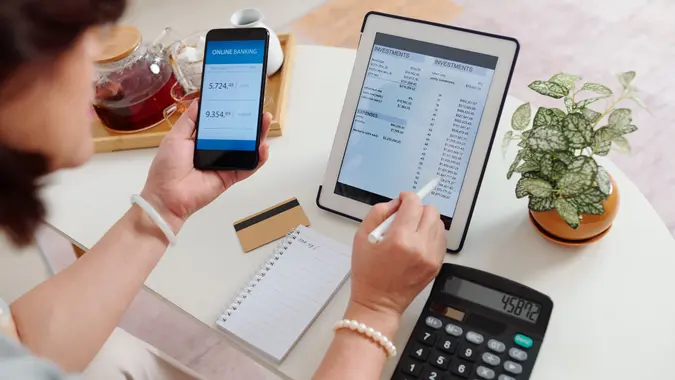Advertiser Disclosure
GOBankingRates works with many financial advertisers to showcase their products and services to our audiences. These brands compensate us to advertise their products in ads across our site. This compensation may impact how and where products appear on this site. We are not a comparison-tool and these offers do not represent all available deposit, investment, loan or credit products.
8 Ways Your Bank Can Help You Manage Financial Emergencies
 Written by
Caitlyn Moorhead
Written by
Caitlyn Moorhead
 Edited by
Levi Leidy
Edited by
Levi Leidy

Commitment to Our Readers
GOBankingRates' editorial team is committed to bringing you unbiased reviews and information. We use data-driven methodologies to evaluate financial products and services - our reviews and ratings are not influenced by advertisers. You can read more about our editorial guidelines and our products and services review methodology.

20 YearsHelping You Live Richer

Reviewed by Experts

Trusted by Millions of Readers
Planning for the unexpected may seem counterintuitive, but financial emergencies can strike at any time, leaving you and your family scrambling for solutions to keep something in your bank account. Whether it’s an unanticipated medical bill, car repair or job loss, these situations can cause significant stress and also potentially lead you down a debt spiral.
In these moments, banks play a crucial role in helping you manage your financial emergencies by providing various tools, services and support systems designed to offer both immediate relief and long-term financial stability. Banks and credit unions can offer more than just a checking account to handle your daily transactions or monthly bills.
When it comes to financial decisions, your bank has a wealth of products and services to help you with not only preventative money management tactics but also see you through all types of financial emergencies when they occur. If you are experiencing a loss of income or other form of financial shock, there are money moves you can make now. Here are eight ways your bank can assist before or through a financial crisis.
Build Your Emergency Fund
One of the most effective ways to prepare for the unexpected is by maintaining a separate savings account to put in your emergency fund. Banks offer a variety of savings products that can be specifically designated for emergency funds. Money market accounts, high-yield savings or CDs typically offer higher interest rates than regular savings accounts, helping your money grow while remaining easily accessible when you need it most.
Having a dedicated emergency savings account in a bank that member-FDIC ensures that you have a financial cushion to rely on, reducing the need to resort to high-interest credit cards or loans in times of crisis. Many banks also offer automatic savings plans, where a portion of your paycheck is directly deposited into your emergency fund, making it easier to build and maintain this safety net. It’s recommended that you keep three to six months’ worth of expenses in this account for safe measure.
Avoid Paying Fees With Overdraft Protection
Overdraft protection is another critical service offered by banks to help manage financial emergencies. When an unexpected expense arises, it’s easy to accidentally overdraw your account. Overdraft protection can prevent this by automatically transferring funds from a linked account, such as a savings account, to cover the shortfall.
While there may be fees associated with this service, it can save you from the higher costs of returned checks or declined transactions. You can also set up low-balance alerts for your account to warn you when your funds are depleted which can also help you prevent overdraft fees.
Personal Loans and Lines of Credit
Banks offer personal loans and lines of credit that can provide quick access to funds in a financial emergency. Personal loans are typically unsecured, meaning you don’t need to provide collateral, and they come with fixed interest rates and repayment terms. This predictability can be beneficial when you’re already dealing with the uncertainty of how you can stretch your finances during an unexpected blow to your bank account.
Lines of credit, on the other hand, offer more flexibility. You can borrow as much as you need, up to your approved limit, and only pay interest on the amount you borrow. This can be a lifeline in situations where the full extent of your financial needs is not immediately clear.
Credit Card Options and Solutions
While credit cards should generally be used with caution, they can be a useful tool in managing financial emergencies, especially when you don’t have immediate access to cash. Many banks offer credit cards with features tailored to emergency situations, such as low or 0% introductory APR periods, which allow you to borrow without incurring interest for a set period.
In addition to the financial flexibility credit cards provide, they also offer various consumer protections, such as fraud detection, charge disputes and travel insurance, which can be invaluable in certain emergencies. However, keep in mind that you don’t want to compound your money troubles by charging more than you can afford to pay back, with interest.
Financial Advice, Planning and Counseling
Many financial institutions offer counseling and support services to help you navigate financial emergencies. This can include personalized advice on managing debt, creating a budget or restructuring loans to make them more manageable. Some banks even have dedicated financial advisors who can work with you to create a plan for addressing your immediate needs while securing your long-term financial health with curated investments.
Loan Modification and Forbearance Programs
Economic distress often touches more than just one person, so if you are going through it chances are so is your neighbor. For example, if your town endures a natural disaster or economic downturn, banks often provide loan modification or forbearance programs.
These programs allow you to temporarily reduce or suspend your loan payments, offering crucial relief during periods of financial hardship. While these measures may extend the term of your loan or result in additional interest, they can provide immediate breathing room when you need it most. When it comes to timing out your budget, every little bit counts.
Digital Banking Tools
Modern digital banking tools and mobile apps have made it easier than ever to manage financial emergencies quickly and efficiently. Budget-tracking apps and online banking platforms allow you to monitor your accounts in real time, transfer funds instantly and make payments on the go. Many banks also offer budgeting tools and alerts to help you stay on top of your finances and avoid emergencies before they happen.
Insurance Products
Insurance is one of the best coverage plans for all unexpected financial shocks. Your bank offers a variety of products, such as life, health and unemployment insurance, which can provide financial protection in emergencies. These policies can help cover the costs of unexpected events, ensuring that you and your family remain financially secure even in difficult times.
Final Take To GO
The bottom line is that financial emergencies are an inevitable part of life, but with the right tools and support from your bank, you can manage these challenges more effectively. From emergency savings accounts and personal loans to digital banking tools and financial counseling, banks offer a wide range of services designed to help you weather financial storms. By taking advantage of these resources, you can turn potential financial crises into manageable situations, ensuring your long-term financial well-being.
Share This Article:




You May Also Like


8 Ways To Use Your Bank's Products & Services To Build and Protect Wealth
January 26, 2026
7 min Read

I'm a Bank Advisor: Avoid These 7 Common Account Mistakes and Do This Instead
January 15, 2026
7 min Read



I'm a JPMorgan Chase Advisor: 4 Costly Banking Mistakes Putting Your Money at Risk
January 09, 2026
7 min Read

I'm a Bank Teller: 9 Reasons You Should Never Ask for $2 Bills From the Bank
January 08, 2026
7 min Read


3 Big Reasons Americans' Bank Accounts Are Shrinking -- and How To Fix It
December 11, 2025
7 min Read



Make your money work for you
Get the latest news on investing, money, and more with our free newsletter.
By subscribing, you agree to our Terms of Use and Privacy Policy. Unsubscribe at any time.


Thanks!
You're now subscribed to our newsletter.
Check your inbox for more details.



Sending you timely financial stories that you can bank on.
Sign up for our daily newsletter for the latest financial news and trending topics.
For our full Privacy Policy, click here.
Looks like you're using an adblocker
Please disable your adblocker to enjoy the optimal web experience and access the quality content you appreciate from GOBankingRates.
- AdBlock / uBlock / Brave
- Click the ad blocker extension icon to the right of the address bar
- Disable on this site
- Refresh the page
- Firefox / Edge / DuckDuckGo
- Click on the icon to the left of the address bar
- Disable Tracking Protection
- Refresh the page
- Ghostery
- Click the blue ghost icon to the right of the address bar
- Disable Ad-Blocking, Anti-Tracking, and Never-Consent
- Refresh the page






